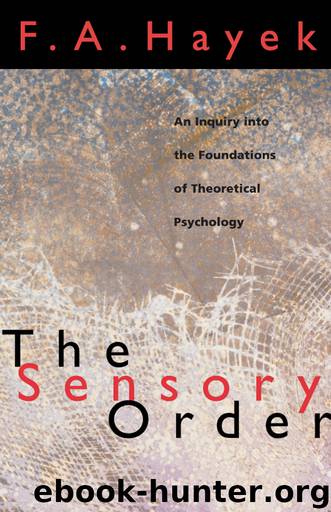The Sensory Order by F. A. Hayek

Author:F. A. Hayek
Language: eng
Format: epub
Publisher: The University of Chicago Press
2. THE GRADUAL FORMATION OF A ‘MAP’ REPRODUCING RELATIONS BETWEEN CLASSES OF EVENTS IN THE ENVIRONMENT
5.17. The connexions formed by the linkages between different impulses will evidently reproduce certain regularities in the occurrence of the external stimuli acting on the organism. The network of these connexions will reproduce not any attributes of the individual stimuli (whose identity is determined solely by their capacity of setting up impulses in a particular sensory fibre, or group of fibres), but a sort of record of past associations of any particular stimulus with other stimuli which have acted upon the organism at the same time. While such a record, dependent upon the frequency which in the course of the development of an individual (or possibly species) certain stimuli have occurred together, will reproduce certain relationships between these stimuli determined by the physical differences between them, it will clearly not give a full or correct reproduction of all the relations which can be said ‘objectively’ to exist between these stimuli.
5.18. We have seen in the first Chapter (1.14–1.19) that a description of the stimuli in physical terms involves a classification of these stimuli based solely on their observed relations towards each other and neglecting any difference or similarity of the response of the organism on which they act. It seems to be in conformity with general scientific procedure to treat only those differences between stimuli which manifest themselves in their relations to other stimuli as differences belonging to the physical world (or as differences constituting the physical order of the universe), and to regard differences and similarities between groups of stimuli which show themselves solely in their effects on certain types of organisms as due to the organization of these organisms. Our present task is to show the kind of classification, or of ordering of the stimuli, which, through the process we have sketched, such an organism is likely to develop.
5.19. The gradual evolution of the mental order involves thus a gradual approximation to the order which in the external world exists between the stimuli evoking the impulses which ‘represent’ them in the central nervous system. But while conceptual thinking has long been recognized as a process of continuous reorganization of the (supposedly constant) elements of the phenomenal world, a reorganization which makes their arrangement correspond more perfectly with experience, we have been led to the conclusion that the qualitative elements of which the phenomenal world is built up, and the whole order of the sensory qualities, are themselves subject to continuous change. There remains, in consequence, no justification for the sharp distinction between the direct sensory perception of qualities and the more abstract processes of thought;3 we shall have to assume that the operations of both the senses and the intellect are equally based on acts of classification (or reclassification) performed by the central nervous system, and that they are both part of the same continuous process by which the microcosm in the brain progressively approximates to a reproduction of the macrocosm of the external world.
Download
This site does not store any files on its server. We only index and link to content provided by other sites. Please contact the content providers to delete copyright contents if any and email us, we'll remove relevant links or contents immediately.
International Integration of the Brazilian Economy by Elias C. Grivoyannis(111064)
The Radium Girls by Kate Moore(12033)
Turbulence by E. J. Noyes(8055)
Nudge - Improving Decisions about Health, Wealth, and Happiness by Thaler Sunstein(7711)
The Black Swan by Nassim Nicholas Taleb(7135)
Rich Dad Poor Dad by Robert T. Kiyosaki(6642)
Pioneering Portfolio Management by David F. Swensen(6303)
Man-made Catastrophes and Risk Information Concealment by Dmitry Chernov & Didier Sornette(6022)
Zero to One by Peter Thiel(5805)
Secrecy World by Jake Bernstein(4755)
Millionaire: The Philanderer, Gambler, and Duelist Who Invented Modern Finance by Janet Gleeson(4481)
The Age of Surveillance Capitalism by Shoshana Zuboff(4301)
Skin in the Game by Nassim Nicholas Taleb(4253)
The Money Culture by Michael Lewis(4211)
Bullshit Jobs by David Graeber(4195)
Skin in the Game: Hidden Asymmetries in Daily Life by Nassim Nicholas Taleb(4009)
The Dhandho Investor by Mohnish Pabrai(3770)
The Wisdom of Finance by Mihir Desai(3751)
Blockchain Basics by Daniel Drescher(3585)
